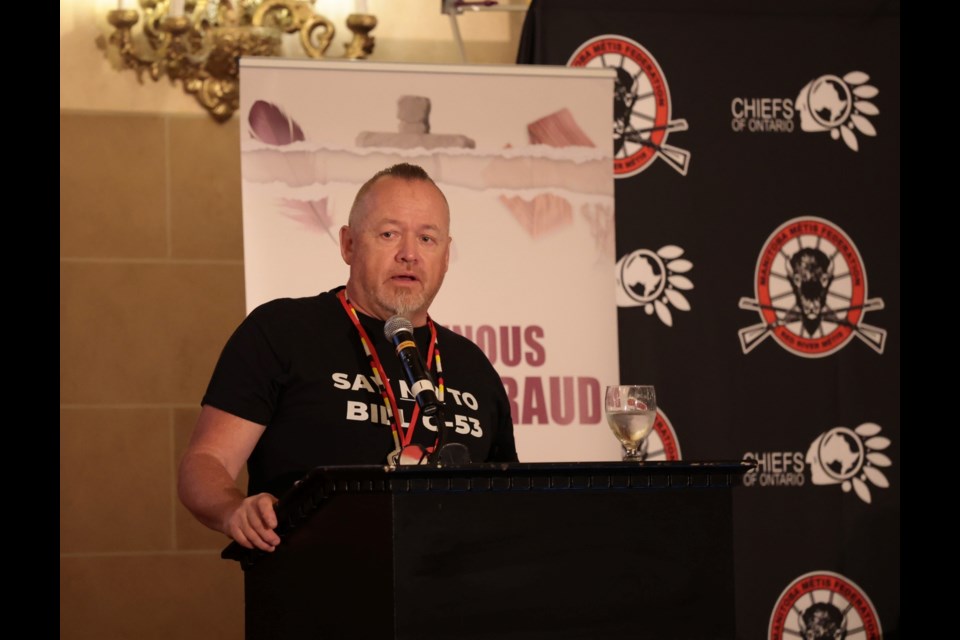Ontario First Nations Chief Scott McLeod says governments are to blame for allowing groups like the Métis Nation of Ontario (MNO) to flourish.
Speaking during day two of the Indigenous Identity Fraud Summit in Winnipeg Wednesday, the Nipissing First Nation chief said "most of the people truly believe they are Métis in Ontario and for good reason; they’ve been told that all their lives."
McLeod said they've been "misled to believe that just because you have a drop of Indigenous blood running through your veins that somehow you are a nation.
“That you can take these people spread out around Ontario and put them together and they become a nation. Well, that’s not how nations are created," said McLeod, who is the Chiefs of Ontario spokesperson in its opposition to Bill C-53, a federal piece of legislation that seeks to formally recognize Métis governments in Alberta, Saskatchewan and Ontario.
McLeod went on to outline how “those nations are being written into history in Ontario where they never were, on the simple basis that they may or may not have an Indigenous ancestor dating back to the 1600s.
“No one from here can say they have an ancestor from Scotland, Holland or France and claim rights in those countries. Why is it okay to do that in our nations?”
McLeod said Indigenous people need to stick together since provincial and federal government are not the gatekeepers on this particular issue.
“They’re the ones opening the gates,” he said. “We are the gatekeepers and we need to stand firm, we need to stand united and protect our homelands, protect our histories, protect our people and protect our nations.”
McLeod urged the federal government to “kill the bill” in reference to Bill C-53 and had some advice for the provincial government: “Erase the six nations you identified in Ontario and the sooner the better.”
During the first day, leaders passed a resolution calling on the federal government to cease all negotiations with the MNO, and for Ontario to retract the identification of six new communities the province recognized in 2017.
It also urges the federal and provincial governments to stop "accommodating Indigenous identity theft," and to take proactive steps with "legitimate rights holders" to protect their constitutional and inherent rights.
The Métis Nation of Ontario has been the main topic of the summit, co-hosted by the Manitoba Métis Federation (MMF) and the Chiefs of Ontario (COO). The federal bill is hotly contested by both groups, who say MNO's inclusion threatens their rights and who question the validity of the organization altogether.
For its part, the MNO sent out a release regarding the conference and its exclusion from it.
“As the recognized government of Métis people and communities in Ontario, MNO affirms its commitment to constructive dialogue and factual discourse regarding the rights and history of its communities,” the release stated, noting that the MNO represents close to 28,000 Métis citizens in Ontario.
“Historic rights-bearing Métis communities unquestionably exist in Ontario.”
The release goes on to note this was proven by the Supreme Court of Canada decision involving the harvesting rights of the Powleys in the Sault Ste. Marie area and that the MNO will defend its citizens against attacks in the media and online.
“Our youth have faced harassment at school. Entire Métis families have had their identities called into question," the entity noted. "This needs to end.”
Furthermore, the MNO stated that its exclusion "undermines the potential for a comprehensive and inclusive discussion on this critical issue affecting all Indigenous communities in Canada."
But despite its absence, the MNO's presence loomed large with Mississaugas of the Credit First Nation member Larry Sault asking conference attendees what he and others should call those in the province who identify as Métis.
“How do we change our language on the Indigenous side to be consistent moving into the future on how we refer to the Métis?” he asked.
Will Goodon of the Manitoba Metis Federation said that confusion is definitely out there and needs to be addressed.
“When the Chiefs of Ontaio and folks elsewhere talk about the different issues they’re having with the Métis, you’re not having an issue with the Métis, you’re having an issue with the so-called Métis, you're having an issue with the fake Métis, you’re having an issue with the fraudulent Metis,” Goodon said, noting his own organization is moving away from calling itself the Historic Metis Nation and will now identify as the Red River Metis.
Goodon, who called into question the MNO's status in a recent MidlandToday article, said the confusion is based on the fact the Métis Nation of Ontario’s uses the word ‘nation’ in its moniker.
“To make sure everyone understands, who are the legitimate rights holders,” Goodon said, referring to the decision to refer to themselves as the Red River Metis moving forward.
“We’re very proud to be able to say that and it’s sad that the reason we had to do that is because of the fraudsters in Ontario, because of the fakes further east in Quebec and the Maritimes.”
In its statement, the MNO further notes that it shares the MMF’s and COO’s concern that Indigenous identity fraud is a serious issue that requires serious solutions.
“The MNO remains steadfast in its dedication to the well-being of its citizens and to the integrity of Métis governance," it said. "We urge MMF and COO to embrace an open and inclusive approach to discussions about Indigenous identity and rights.”
